Are you looking for a caffeine-free energizer?
It’s not always easy to fit writing into your busy life.
Sometimes, you find yourself staring at the page with your eyelids drooping or your mind blanking out.
What do you do when that happens? You may use caffeinated beverages like coffee or tea to bring your attention back to the page. But what if you’re sensitive to caffeine, or you write late at night?
Then you need a different type of brain booster.
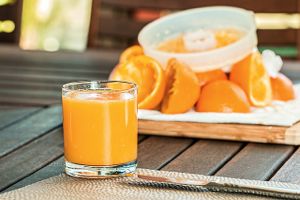 Caffeine-Free Beverage 1. Orange Juice Increases Thinking Power
Caffeine-Free Beverage 1. Orange Juice Increases Thinking Power
This is one of the best beverages you can drink before sitting down to write.
In a 2016 study, researchers gave men between the ages of 30 and 65 either one cup of orange juice or a placebo on two different days, separated by a two-week washout. They then tested the men’s thinking and mood at two and six hours after consumption of the beverage.
Results showed that those who drank the orange juice performed significantly better on the cognitive tests, and also felt more alert than those who consumed the placebo. Even better—the effects were still there six hours later.
No matter when you sit down to write, pouring yourself a glass of OJ may give you that brain boost you need. Besides, it’s very healthy, and full of vitamin C and free-radical-fighting antioxidants.
Caffeine-Free Beverage 2. Water Keeps Fatigue at Bay
Are you getting enough water throughout the day?
According to a survey of 300 general practitioners, most people are not.
The results of that survey showed that one in five people goes to see the doctor for symptoms of simple dehydration. Those symptoms can include difficulty focusing and loss of concentration.
That means if you’re having trouble keeping your mind on your story, you could be slightly dehydrated. Without enough water in the body, you’re more likely to feel fatigue and to suffer from headaches.
Dr. Roger Henderson, advisor to the Natural Hydration Council, told the Daily Mail that he sees many patients who are feeling tired all the time: “There are, of course, several reasons that could be causing this but a surprisingly common cause is that they are dehydrated.”
Try to drink more throughout the day. Then before you start writing, get yourself a nice cool glass and drink at least part of it, then have the rest near you to sip on while you work. You can flavor it up by adding some fresh fruit.
Caffeine-Free Beverage 3. Beet Juice Stimulates the Brain
Beet juice is good for you in many ways, but some studies have found that it is especially beneficial for the brain.
Scientists from Wake Forest University gave 26 men and women aged 55 and older either a beetroot juice supplement or a placebo one hour before the participants went for a 50-minute walk on the treadmill. Beet juice naturally increases nitric oxide levels in the body, which helps stimulate blood flow.
Results showed that those who got the beet root juice supplement had brains that performed more efficiently, acting more like the brains of younger adults.
Study author W. Jack Rejeski stated in a news release that “compared to exercise alone, adding a beet root juice supplement to exercise resulted in brain connectivity that closely resembles what you see in younger adults.”
Another study also found that a diet high in compounds that boost nitric oxide levels improved blood circulation in “critical brain areas known to be involved in executive functioning.”
In other words, it helps you think better! So you may want to consider adding beet root juice to your daily diet to help boost your writing brainpower.
Caffeine-Free Beverage 4. Pomegranate Juice Boosts Memory
Have you tried this juice yet? It’s packed full of healthy antioxidants that are good for anyone at any age, but if you’re a writer over 40—or if you’re working on a series that requires you to remember a lot of characters and timelines—you may want to make this juice your beverage of choice.
That’s because this one has been found to help boost memory.
In a 2013 study, researchers gave one group of older participants pomegranate juice and another group a flavor-matched placebo for four weeks. They used MRIs to analyze brain activity, and also put the participants through memory tests and blood tests.
After four weeks, only those drinking the pomegranate juice experienced significant improvement in verbal memory and visual memory tasks. They also had measurable positive changes in their brains.
Researchers from the United Kingdom found a compound in pomegranate called “punicalagin” that may slow the progression of Alzheimer’s disease. It seems to inhibit inflammation in brain cells, and to help protect healthy cells.
These studies and more show that pomegranate has a protective effect on the brain, so it’s a good idea to enjoy a glass once or twice a week along with your other brain-boosting beverages.
Caffeine-Free Beverage 5. Grape Juice Eases Stress
If you’re a stressed-out writer, this is the juice for you. Not only is it full of antioxidants that help reduce your risk of heart disease, it has also been found to help improve your thinking.
In a recent 2016 study, researchers recruited 25 working mothers of pre-teen children aged 40-50 years. They chose these mothers because they wanted to test people who were often stressed.
“Increased stress can impair cognitive function and elevate blood pressure,” the researchers wrote. “Thus, we examined the potential beneficial effect of CGJ [Concord Grape Juice] in individuals with somewhat stressful and demanding lifestyles.”
The researchers then gave the moms either 12 ounces of grape juice or a taste-matching placebo daily for 12 weeks with a four-week washout in between.
They also tested the women to assess their thinking power, and subjected 17 of them to a driving performance assessment.
Results showed that those drinking the grape juice experienced significant improvements in spatial memory and driving performance over those who drank the placebo.
The grape juice had lasting effects, carrying over even into the second 12-week period. The scientists concluded that grape juice could have cognitive benefits for anyone, and that the benefits were “apparent in complex everyday tasks….”
Going through a book launch or awaiting your next round of edits? Grape juice may help you to focus.
What beverage will you choose next time you get ready to write? I recommend you choose one of these juices to get your creative juices flowing!
How do you boost writing energy?
Sources
Alharbi, M. H., Lamport, D. J., Dodd, G. F., Saunders, C., Harkness, L., Butler, L. T., & Spencer, J. P. (2015). Flavonoid-rich orange juice is associated with acute improvements in cognitive function in healthy middle-aged males. European Journal of Nutrition, 55(6), 2021-2029. Retrieved from https://www.ncbi.nlm.nih.gov/pubmed/26280945
Bookheimer, S. Y., Renner, B. A., Ekstrom, A., Li, Z., Henning, S. M., Brown, J. A., … Small, G. W. (2013). Pomegranate Juice Augments Memory and fMRI Activity in Middle-Aged and Older Adults with Mild Memory Complaints. Evidence-Based Complementary and Alternative Medicine, 2013, 1-14. Retrieved from https://www.hindawi.com/journals/ecam/2013/946298/
Borland, S. (2015, May 26). Could one in five GP visits be due to dehydration? Retrieved from http://www.dailymail.co.uk/health/article-3096702/Could-one-five-GP-visits-dehydration-New-study-claims-fatigue-epidemic.html
Lamport, D. J., Lawton, C. L., Merat, N., Jamson, H., Myrissa, K., Hofman, D., … Dye, L. (2016). Concord grape juice, cognitive function, and driving performance: a 12-wk, placebo-controlled, randomized crossover trial in mothers of preteen children. The American Journal of Clinical Nutrition, 103(3), 775-783. Retrieved from http://eprints.whiterose.ac.uk/95958/1/Am%20J%20Clin%20Nutr-2016-Lamport-ajcn.115.114553.pdf
McDermott, A. (2016, November 11). Beetroot Juice: 12 Health Benefits. Retrieved from https://www.healthline.com/health/food-nutrition/beetroot-juice-benefits#exercise-stamina
Presley, T. D., Morgan, A. R., Bechtold, E., Clodfelter, W., Dove, R. W., Jennings, J. M., … Miller, G. D. (2011). Acute effect of a high nitrate diet on brain perfusion in older adults. Nitric Oxide, 24(1), 34-42. Retrieved from https://www.ncbi.nlm.nih.gov/pmc/articles/PMC3018552/
Roberts, A. (2017, April 19). With beetroot juice before exercise, aging brains look ‘younger? | Wake Forest News. Retrieved from http://news.wfu.edu/2017/04/19/beetroot-juice-exercise-aging-brains-look-younger/
Sauer, A. (2015, February 1). Pomegranate compound may treat Alzheimer’s and Parkinson’s. Retrieved from http://www.foxnews.com/health/2014/08/22/pomegranate-compound-may-treat-alzheimers-and-parkinsons.html
Yuan, T., Ma, H., Liu, W., Niesen, D. B., Shah, N., Crews, R., … Seeram, N. P. (2015). Pomegranate’s Neuroprotective Effects against Alzheimer’s Disease Are Mediated by Urolithins, Its Ellagitannin-Gut Microbial Derived Metabolites. ACS Chemical Neuroscience, 7(1), 26-33. Retrieved from https://pubs.acs.org/doi/abs/10.1021/acschemneuro.5b00260


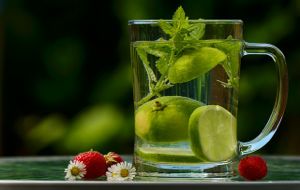
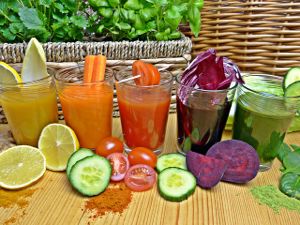
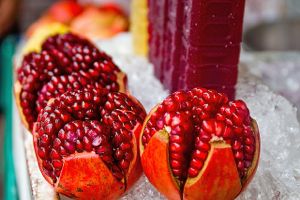
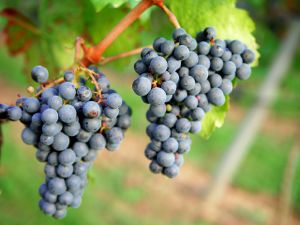
For limiting caffeine intake, I use Dandy Blend (made from roasted roots of dandelion, chicory and beets, and the grains of barley and rye). It has a great coffee-like flavor and is ready in an instant. No jitters.
I’ve heard of that, Steve, and it sounds yummy, as I love dandelion tea. Thanks for the tip!
After my morning coffee ritual is complete, I drink hot or iced herbal teas and lots of water. I have been thinking about trying that beet juice, though. My brain could use some stimulation! 😀
I’ve gotten back on a daily chart for water—amazing how much I wasn’t drinking. Ha–I think we all could use the beet juice! :O)
A very timely posting. I’m implementing some large lifestyle changes and this is perfect for me. Thank you so much. I had to do a double take on point three though, I thought it said “Beetle Juice Stimulates the Brain.” Time for some new glasses.
Sounds uplifting, Dave. Ha ha ha. Too funny! That has to be true on some level, eh? :O)